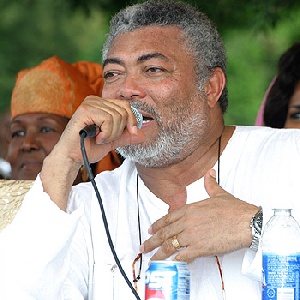Port Harcourt, Nigeria -- President Jerry Rawlings, on Monday, examined the Niger Delta crisis and concluded that past Nigerian leaders were not fair to the people in managing resources from the region.
He also pilloried some African leaders whom he said were insincere to the people, hence the rate of poverty and underdevelopment in most countries of the continent.
Rawlings was in Port Harcourt for the opening of the first-ever Sustainable Development Conference initiated by the Rotimi Amaechi-led Rivers State Government.
In the thought-provoking address, Rawlings challenged leaders in Africa to strive to show some appreciable level of sincerity as they govern the people, saying that was the only way of achieving sustained development.
Sounding rather sarcastic, Rawlings said Ghanaians were hopeful that oil would be exploited in commercial quantity in their land, but the natives had vowed not to handle the oil funds the Nigerian way. His words: "Oil exploration has been going on in Ghana for several decades. There has been modest find from time to time. Over the years I have heard a number of Ghanaians say that they pray that if commercial quantities were found, it should just be enough for Ghana's own energy needs.
"If you ask them why they say so, they will reply that, 'we don't want the things that happened in Nigeria to happen here,'" Rawlings said.
He explained the concern of Ghanaians on poor management of oil resources by Nigerian leaders.
According to him, the Niger Delta had remained restive because owners of the resources were not allowed to benefit from the proceeds of natural resources, even though their waters and lands had been polluted as a result of oil exploration. "For centuries, the Niger Delta was literally a backwater of small subsistence communities. Port Harcourt began by exporting slaves and later palm oil. Then petroleum came. The people on whose land this development was taking place had very little chance of getting jobs in the new industry, because the educational system had not given them the necessary technical knowledge. As farmers and fishermen, their lands were polluted and rendered useless.
"Poverty increased and with it anger increased. The people of the land saw some people becoming very, very rich; they could perhaps swallow the fact that foreign-based oil companies were getting rich. After all, these people had invested some money and deserved some returns.
"But when they saw some of their own draining the oil profits and obscene display of wealth, they became angry. But as soon as they became angry, they were identified as terrorists, as obstacle in the way of prosperity. And so they were hunted down. Since then the international TV stations have documented impoverished peasants, trying in desperation to tap into oil pipelines, only to become incinerated corpse," he added.
The former President said the time had come for leaders in the continent to face the realities of developmental challenges and take fresh steps to address the wrongs of the past. He said there cannot be development in any society when wealth is only in the hands of a small percentage of the people, whereas the majority are wallowing in poverty.
"Now is the opportunity to forgo your anger at the injustices of the past, and to express objectively and frankly your peoples' concern as the primary stakeholders in the resources of this State and as real partners in development for future generations," he counselled.
"Every corner of this rich continent of ours is endowed with resources that can enhance the sustained well-being of our areas, nations and of Africa.
"As I examined the documents of the Rivers State Sustainable Development Agency, I observed that you intend to inspire a whole cadre of community-level facilitators. To succeed, you must inspire rather than instruct. This calls for the inspiration to mobilise the masses, ordinary citizens, to construct a vision for change," he added.
General News of Tuesday, 14 October 2008
Source: Daily Independent

















